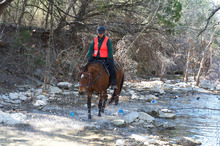Congress has passed and the President has signed a multi-year national highway bill known as the Fixing Americaâs Surface Transportation Act, or the FAST Act. The bill reauthorizes the Federal Highway Administrationâs Recreational Trails Program (RTP) for the next five years and provides $85 million annually for the program.

United effort to keep trails open for horses and riders
Grassroots support from recreational trail users, including many equestrians, played an important role in making sure RTP was passed and the AHC appreciates all the individual horsemen and organizations that contacted their Representatives in support of RTP.
© 2015 by Jim Edmondson
The last highway bill was set to expire in December and Congress has been working on various versions of a national surface transportation bill for most of this year. During the Congressional process several attempts were made to eliminate the RTP program from the bill. However, these attempts were unsuccessful.
âWe are very pleased RTP was included in the FAST Act. Every time a multi-year national highway bill is debated there is always an attempt to eliminate this program and this time was no different,â said AHC vice president of government affairs Ben Pendergrass.
âGrassroots support from recreational trail users, including many equestrians, played an important role in making sure RTP was included in bill. The AHC appreciates all the individual horsemen and organizations that contacted their Representatives in support of RTP.â
âStrong support from Congressional champions of the program, particularly Senators Amy Klobuchar (D-MN), James Risch (R-ID), Richard Burr (R-NC) and Jeanne Shaheen (D-NH), as well as Representatives Hanna (R-NY), Rick Larsen (D-WA), Tim Walz (D-MN) and Jaime Herrera Beutler (R-WA), was also essential to preserving the program,â continued Pendergrass.
Since its inception RTP has provided money for thousands of state and local trail projects across the country, including many that benefit equestrians. RTP provides funding directly to the states for recreational trails and trail-related facilities for all recreational trail users. It is funded with a portion of the gas taxes paid into the Highway Trust Fund by recreational off-highway vehicle users.
To learn more about the program and find information about contacting your state RTP administrator for guidance on State policies and project eligibility requirements visit http://www.fhwa.dot.gov/environment/recreational_trails/. You can also look up the projects funded in your state in the RTP project database.
The AHC has advocated for the RTP program since its inception and is an active member in the Coalition for Recreational Trails (CRT). CRT is federation of national and regional trail-related organizations formed exclusively to build awareness about and protect the RTP program.
âIt is a victory for all recreational users that RTP has been reauthorized. However, Governors still have the option to opt out of the program. This year only one state has done this (Connecticut) so it is important that recreational riders stay vigilant against any attempts to eliminate the program in their state,â said Pendergrass.
âAdditionally, if you have a trail project in your area you would like to see receive funding the AHC encourages you to visit the RTP website and contact your state RTP administrator.
About the American Horse Council
As the national association representing all segments of the horse industry in Washington, D.C., the American Horse Council works daily to represent equine interests and opportunities. Organized in 1969, the AHC promotes and protects the industry by communicating with Congress, federal agencies, the media and the industry on behalf of all horse related interests each and every day.
The AHC is member supported by individuals and organizations representing virtually every facet of the horse world from owners, breeders, veterinarians, farriers, breed registries and horsemen's associations to horse shows, race tracks, rodeos, commercial suppliers and state horse councils.
